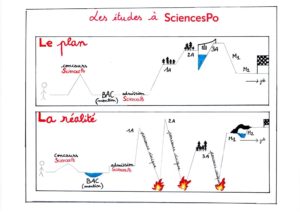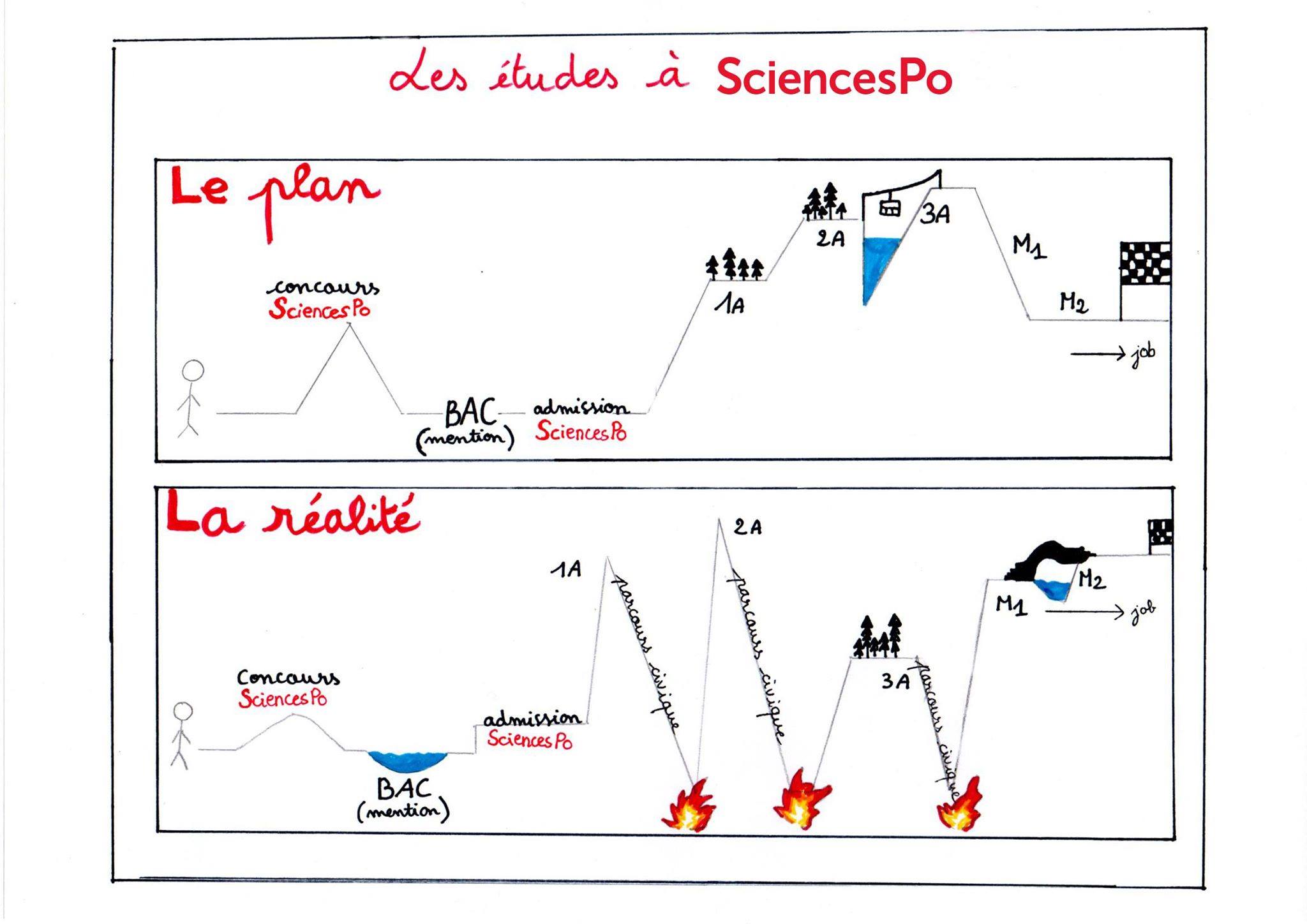
Illustration: Severine Peyron
It hit 2As in the face recently, yet again, the faithful words: “Motivez l’objet du stage et sa pertinence par rapport à votre projet professionnel”. In declaring the 2A Independent Project for the Civic Engagement Program, students have to articulate their personal projects, and explain how civic work will help them develop.
The idea of having a coherent narrative, an overarching ambition that links all our activities, is compelling. A student should be able to articulate a few precise goals, and the majority of their extracurriculars, electives and personal interests should relate to these goals. Many of us are probably familiar with this formula, having used it for university applications. It is truly ubiquitous.
Why are universities so keen on this formula? One does not have to look far to find the answer. A deterministic life path is an idea that flirts with all of us. The notion that everything has a purpose, that even a Netflix binge could ultimately be evidence of ambition, is inviting. However, it is delusional to hold everything in one’s life as purposeful in the grand scheme of things.
For our Independent Project declaration and for our 3A applications, the necessity of a well-crafted and coherent ‘personal project’ is obvious.
“The idea is of course good, but I at least don’t really have one particularly big project,” confessed one 2A laughingly.
The idea of a single personal project, one could argue, is the beginning of our specialization into a particular field of expertise. A specific personal project ties into your interests and extracurriculars, giving your CV fuel and pushing you towards a specific Master’s or PhD. It seems neat that the personal project you chose as an undergraduate will somehow manifests itself again when you reach the job market.
Last summer, I worked with private sector cooperation with research institutions. A PhD will, by nature, be highly specific, and profit-motivated companies prefer specialized research that suits their specific needs. Expecting immediate results from academic research in some industries creates a tension between profit-maximising companies, and research institutions pushing for the advancement of their discipline. Profit-maximising is thus hardly ever the single premise for PhD research in general, nor should it be. At a Sciences Po level, the relationship between our personal project and career ambitions can be left to various interpretations.
What purpose is academic specialization serving, and what purpose should it serve? In Sciences Po, do we expect our personal projects to be a gateway to our eventual careers? Is this a legitimate expectation? Previous articles have discussed whether Sciences Po manufactures critical thinkers or employable graduates. The insistence on a personal project opens a new dimension to this debate. Does it help students become career-oriented critical thinkers, or does it rather push them to pretend to be passionate and specialize in something — anything — without considering how the job market will accommodate them?
“I don’t know if people this age have a path picked, but to be fair I feel Sciences Po understands that this project can change”, pondered another 2A. The Civic Engagement Project has been fairly reasonable. The administration has stressed many times that we may approach this project with a very broad scope and alter the approaches we adopt along our project. The question is, do we allow this leeway for ourselves?
Universities have a running joke that students participate in associations only for CV purposes. The joke persists because it is true. If student associations were not included on your CV, participation would look very different. The idea of getting ahead is ingrained in many heads and participation in the civic internship is equally useful on a CV. And so, somewhere in the back of our heads we think “this could be useful for people to know about me, because it demonstrates certain qualities in me.” To what extent is Sciences Po’s insistence on a personal project just shedding light on something we already do?
Being in SPE seems like a good way to demonstrate interest in Environmental Sustainability. Transatlantique could not hurt your chances of landing an internship at NATO. Every true Europhile joins the Jeunes Européens eventually. And yes, these are valid claims, and many people working in associations are motivated by true interest. But they are not solid predeterminations of anyone’s present or future ambitions.
Sciences Po is fixated on this idea of a “project”, yes. At the same, it sometimes offers us the chance to make these projects more like the reality they mirror: processes of success and failure, realization, and surprise.
“What’s the point of doing something if you’re not going to be the best at it?” one of my classmates said once, jokingly. One could go further, and ask “what’s the point of doing something if it’s not pertinent to my personal project?” There is no point, but that is the point.
Teresa is a Finnish 2A in the Euram programme. Her passions include political science, writing and comedy. She normally lays somewhere in between comedy and social criticism, in the spirit of your average Netflix stand-up special.
Are you angry? Do you disagree? Write a response column by first contacting the editor, and we’ll publish your dissenting opinion.
Other posts that may interest you:
- The Problems with French Universalism
- ‘Woke’ advertising is tricky
- Sexism in sports
- The Real Tea: Our Sexual Violence Policy is Not Sufficient
Discover more from The Sundial Press
Subscribe to get the latest posts sent to your email.





